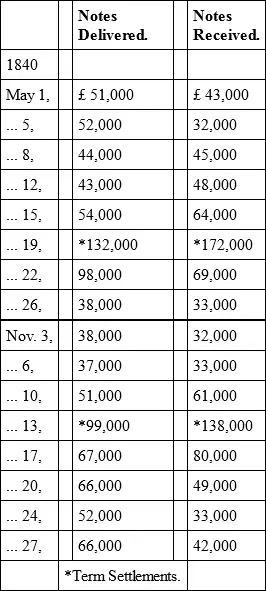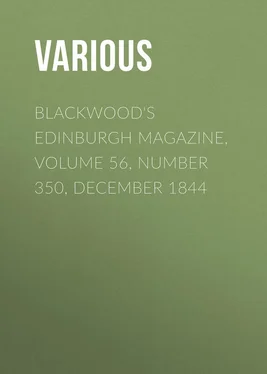Various - Blackwood's Edinburgh Magazine, Volume 56, Number 350, December 1844
Здесь есть возможность читать онлайн «Various - Blackwood's Edinburgh Magazine, Volume 56, Number 350, December 1844» — ознакомительный отрывок электронной книги совершенно бесплатно, а после прочтения отрывка купить полную версию. В некоторых случаях можно слушать аудио, скачать через торрент в формате fb2 и присутствует краткое содержание. Издательство: Иностранный паблик, Жанр: periodic, foreign_edu, Путешествия и география, на английском языке. Описание произведения, (предисловие) а так же отзывы посетителей доступны на портале библиотеки ЛибКат.
- Название:Blackwood's Edinburgh Magazine, Volume 56, Number 350, December 1844
- Автор:
- Издательство:Иностранный паблик
- Жанр:
- Год:неизвестен
- ISBN:нет данных
- Рейтинг книги:4 / 5. Голосов: 1
-
Избранное:Добавить в избранное
- Отзывы:
-
Ваша оценка:
- 80
- 1
- 2
- 3
- 4
- 5
Blackwood's Edinburgh Magazine, Volume 56, Number 350, December 1844: краткое содержание, описание и аннотация
Предлагаем к чтению аннотацию, описание, краткое содержание или предисловие (зависит от того, что написал сам автор книги «Blackwood's Edinburgh Magazine, Volume 56, Number 350, December 1844»). Если вы не нашли необходимую информацию о книге — напишите в комментариях, мы постараемся отыскать её.
Blackwood's Edinburgh Magazine, Volume 56, Number 350, December 1844 — читать онлайн ознакомительный отрывок
Ниже представлен текст книги, разбитый по страницам. Система сохранения места последней прочитанной страницы, позволяет с удобством читать онлайн бесплатно книгу «Blackwood's Edinburgh Magazine, Volume 56, Number 350, December 1844», без необходимости каждый раз заново искать на чём Вы остановились. Поставьте закладку, и сможете в любой момент перейти на страницу, на которой закончили чтение.
Интервал:
Закладка:
Of thirty-one banks in Scotland which issue notes, five only are chartered – that is, the responsibility of the proprietors in those established is confined to the amount of their subscribed capital. The remaining twenty-six are, with one or two exceptions, joint-stock banks, and the proprietors are liable to the public for the whole of the bank responsibilities to the last shilling of their private fortunes. The number of persons connected with these banks as shareholders is very great, almost every man of opulence in the country being a holder of stock to a greater or a less amount. That some jealousy must exist among so many competitors in a limited field, is an obvious matter of inference. Such jealousy, however, has only operated for the advantage of the public, by the maintenance of a common and vigilant watch upon the manner in which the affairs of each establishment are conducted, and against the intrusion of any new parties into the circle whose capital does not seem to warrant the likelihood of their ultimate stability. Accordingly, the Scottish bankers have arranged amongst themselves a mutual system of exchange, as stringent as if it had the force of statute, by means of which an over-issue of notes becomes a matter of perfect impossibility. Twice in every week the whole notes deposited with the different bank offices in Scotland are regularly interchanged. Now, with this system in operation, it is perfectly ludicrous to suppose that any bank would issue its paper rashly for the sake of an extended circulation. The whole notes in circulation throughout Scotland return to their respective banks in a period averaging from ten to eleven days in urban, and from a fortnight to three weeks in rural districts. In consequence of the rate of interest allowed by the banks, no person has any inducement to keep bank paper by him, but the reverse, and the general practice of the country is to keep the circulation at as low a rate as possible. The numerous branch banks which are situated up and down the country, are the means of taking the notes of their neighbours out of the circle as speedily as possible. In this way it is not possible for the circulation to be more than what is absolutely necessary for the transactions of the country.
If, therefore, any bank had been so rash as to grant accommodation without proper security, merely for the sake of obtaining a circulation, in ten days, or a fortnight at the furthest, it is compelled to account with the other banks for every note they have received. If it does not hold enough of their paper to redeem its own upon exchange, it is compelled to pay the difference in exchequer bills, a certain amount of which every bank is bound by mutual agreement to hold, the fractional parts of each thousand pounds being payable in Bank of England notes or in gold. In this way over-trading, in so far as regards the issue of paper, is so effectually guarded and controlled, that it would puzzle Parliament, with all its conceded conventional wisdom, to devise any plan alike so simple and expeditious.
The amount of notes at present in circulation throughout Scotland is estimated at three millions, or at the very utmost three millions and a half. At certain times of the year, such as the great legal terms of Whitsunday and Martinmas, when money is universally paid over and received, there is, of course, a corresponding increase of issue for the moment which demands an extra supply of notes. It is never considered safe for a bank to have a smaller amount of notes in stock than the average amount which is out in circulation; so that the whole amount of bank-notes, both in circulation and in hand, may be calculated at seven millions. The fluctuation at the above terms is so remarkable, that we are tempted to give an account of the number of notes delivered and received by the bank of Scotland in exchange with other banks during the months of May and November 1840: —

It will be seen from the above table how rapidly the system of bank exchange absorbs the over-issue, and how instantaneously the paper drawn from one bank finds its way into the hands of another.
If further proof were required of the absurdity of the notion, that a paper circulation has a necessary tendency to over-issue, the following fact is conclusive. The banking capital in Scotland has more than doubled between the years 1825 and 1840 – a triumphant proof of their increased stability; whilst the circulation has been nearly stationary, but, if any thing, rather diminished than otherwise . We quote from a report to the Glasgow Chamber of Commerce.
"The first return of the circulation was made in Scotland in 1825. Every one knows the extraordinary advance which Scotland has made between that period and 1840; for instance, in the former of these years, she manufactured 55,000 bales of cotton, in the latter, 120,000 bales. In 1826, the produce of the iron furnaces was 33,500 tons; in 1840, about 250,000 tons. In 1826, the banking capital of Scotland was £4,900,000; in 1840, it was about £10,000,000; yet with all this progress in industry and wealth, the circulation of notes, which in 1825 varied from £3,400,000 to £4,700,000, was in 1839 from £2,960,000 to £3,670,000, and in the first three months of 1840, £2,940,000."
We are induced to dwell the more strongly upon these facts, because we have strong suspicions that our opponents will endeavour to get at our monetary system by raising the senseless cry of over-issue – senseless at any time as a political maxim, it being the grossest fallacy to maintain that an increased issue is the cause of national distress, unless, indeed, it were possible to suppose that bankers were madmen enough to dispense their paper without receiving a proper equivalent – not only senseless, but positively nefarious, when the clear broad fact stares them in the face, that Scotland has in fifteen years thrown double the amount of capital into its banking establishments, increased its productions in a threefold, and in some cases a sevenfold ratio, augmented its population by nearly half a million, (one-fifth part of the whole,) and yet kept its circulation so low as to exhibit an actual decrease.
If we were called upon to state the cause of this certainly singular fact, we should, without any hesitation, attribute it to the great increase of the bank branches. The establishment of a branch in a remote locality, has invariably, from the thrifty habits of the Scottish people, absorbed all the paper which otherwise would have been hoarded for a time, and left in the hands of the holders without any interest. It would thus seem, from practice, that the doctrines of the political economists upon this head are absolutely fallacious; that the increase of banks, supposing these banks to issue paper and to give interest on deposits, has a direct tendency to check over-circulation, and in fact does partially supersede it.
With these facts before us, we consider that the measure of last session, prohibiting any further issue of notes beyond those already taken out by the banks, is almost a dead letter. We have not the least fear, that under any circumstances there can be a call for a larger circulation; at the same time, we demur to the policy which ties our hands needlessly, and we object to all restriction where no case for restriction has been shown. We look upon that measure as especially unfair to the younger banks, whose circulation is not yet established, and whose progress has thus received a material check, from no fault of their own, but from want of ministerial notice. With every system where competition is the acknowledged principle, it is clearly impolitic to interfere; nor can we avoid the painful conviction, that this first measure, though comparatively light and generally unimportant, was put out by way of feeler , in order to test the temper of the Scottish people – to ascertain whether eighteen years of prosperity might not have made them a little more supple and pliable, and whether they were likely to oppose to innovation the same amount of obstinate resistance as before. It is dangerous to permit the smallest rent to be made in a wall, for, with dexterous management, that rent may be so widened, as to bring down the whole superstructure.
Читать дальшеИнтервал:
Закладка:
Похожие книги на «Blackwood's Edinburgh Magazine, Volume 56, Number 350, December 1844»
Представляем Вашему вниманию похожие книги на «Blackwood's Edinburgh Magazine, Volume 56, Number 350, December 1844» списком для выбора. Мы отобрали схожую по названию и смыслу литературу в надежде предоставить читателям больше вариантов отыскать новые, интересные, ещё непрочитанные произведения.
Обсуждение, отзывы о книге «Blackwood's Edinburgh Magazine, Volume 56, Number 350, December 1844» и просто собственные мнения читателей. Оставьте ваши комментарии, напишите, что Вы думаете о произведении, его смысле или главных героях. Укажите что конкретно понравилось, а что нет, и почему Вы так считаете.












